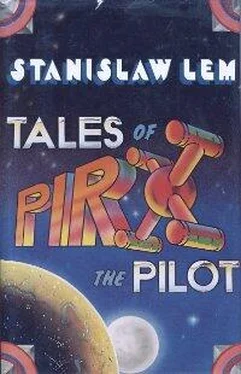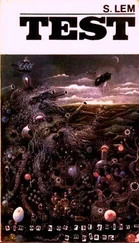He was at the handle in less than no time.
You moron! he thought, and he grabbed the metal handle and yanked until his shoulder joint cracked. The lever, its metal rod glistening with oil, was fully extended, but the blister hadn’t wiggled an inch. He stood staring at the glass bubble in stunned bewilderment, at the video screens ablaze with moonlight, at the blinking light overhead… He jerked on the lever again, even though it was out as far as it would go. Nothing.
The key! The key to the cassette! He fell flat on the floor and searched under the seat. There was nothing to be seen except the cribsheet.
The lights blinked; the circuit breaker switched. Now when the lights dimmed, the moonlight cast everything in a stark, skeleton-bone white.
It’s all over, he thought. Should he fire the ejection rocket and bail out in the encapsulated seat? No, it wouldn’t work; without any atmospheric drag, the parachute wouldn’t brake. “Help!”—he wanted to yell, but there was no one to whom he could call in distress: he was all alone. What to do?! There just had to be a way out!
He scrambled back to the emergency lever and almost tore his arm out of his socket, now so frantic he wanted to cry. It was all so dumb… Where was the key? And why the malfunction in the emergency lever? The altimeter. At one sweeping glance, he read off the displays: 9,500 kilometers. The saw-toothed ridge of Timocharis now stood out against the luminous background in sharp relief. He even had visions of where his ship was about to drill a hole in the pumice-covered rock. A loud crash, a blinding explosion, and…
During a brief interval of light, his frantically shifting gaze fell on the set of four copper wires. The little black speck spanning the cables—all that was left of the incinerated fly—was clearly discernible, even from a distance. Sticking out his neck and shoulder like a soccer goalie about to make a flying save, Pirx lunged forward with all his weight, and was almost knocked unconscious by the force of the collision. He bounced off the blister’s glass wall like an inflated inner tube and crumpled to the floor. The outer shell did not so much as jiggle. Struggling to his feet, panting, with a bleeding mouth, he got ready to make another flying lunge at the glass wall.
That’s when he happened to glance down.
The manual override. Designed to give rapid, full-thrust acceleration in the l0g range. Operated by direct mechanical control and capable of providing an emergency thrust lasting less than a second in duration.
But the greater the rate of acceleration, he suddenly realized, the faster his descent to the lunar surface. Or would it be? No, it would do just the opposite—it would have a braking effect! But wouldn’t the reaction be too short to act as a brake? The braking had to be continuous. So much for the override. Or was it?
He made a dive for the control stick, grabbing it on his way down, and pulled for all he was worth. Without the contour couch to cushion his impact, he could have sworn all his bones had been fractured when he hit the deck. Another pull on the stick, another powerful lurch. This time he landed on his head, and if it hadn’t been for his helmet’s foam-rubber liner, his skull would have been shattered.
The fuse panel started sizzling, the blinking suddenly stopped, and a soft and steady electric light lit up the cabin interior.
The two bursts of acceleration, fired in quick succession by manual control, had been enough to dislodge the minute sliver of carbon from between the wires, thus eliminating the short circuit once and for all. With the salty taste of blood in his mouth, Pirx made a diving leap for the couch, but instead of landing in it, sailed high up over the back and rammed his head into the ceiling, the blow softened only somewhat by his helmet.
Just as he was getting set to leap into the air, the now activated kill-switch cut off the rocket, and the last trace of gravitation disappeared. Propelled by its own momentum, the spacecraft was falling straight toward the rocky ruins of Timocharis.
He bounced off the ceiling, spit, and the bloody saliva floated next to him in a galaxy of silver-red bubbles. Frantically he twisted and turned and stretched out his arm toward the couch. For added momentum he emptied his pockets and threw their contents to the back of him, the force of which propelled him downward, gradually and gently. His fingers, now so taut that his tendons threatened to snap, at first barely scraped the nickel-plated tubing before getting a firm grip on the frame. He didn’t let go. Like an acrobat doing a handstand on parallel bars, he tucked in his head and pulled himself into an upright position, grabbed hold of the seat belt, and lowered himself down on it, at the same time wrapping the belt around his trunk. Not stopping to buckle the belt, he stuck the loose end between his teeth; it held. Now for the control levers and the braking pedals!
The altimeter showed 1,800 kilometers to lunar surface. Would he be able to brake in time? Impossible—not at a velocity of 45 kilometers per second. He would have to pull out of the nose dive by describing a steep turn. There was no other way.
Firing his pitch rockets, he accelerated to 2g, 3g, 4g. Not enough! Not nearly enough!
As he applied full thrust for the pullout recovery, the lunar surface, shimmering quicksilverlike on the video screen, and so like a permanent fixture until now, began to quiver and slowly subside, his contour couch squeaking under the increasing pressure of his body. The ship was going into a steep arc directly over the lunar surface, an arc with a radius large enough to compensate for the tremendous velocity. The control stick was pushed to the limit. Pressed against the spongy backrest, with his space suit not connected to the air compressor, he could feel the air being squeezed out of his lungs and his ribs being bent inward. He began seeing gray spots and waited for the blackout, his eyes riveted to the radar altimeter, which kept grinding out one set of digits after another: 990… 900… 840… 760…
He knew he was at maximum thrust, but he kept exerting pressure on the handgrip nonetheless. He was performing the tightest possible loop, yet kept on losing altitude as the digital values continued to drop—albeit at a slower rate—and he continued to find himself on the descending arm of the steep arc. Despite a paralysis of the head and eyeballs, he kept his eyes trained on the trajectometer.
As always when a space vehicle approached the danger zone of a celestial body, the trajectometer displayed not only the ship’s flight curve—along with its projected course, faintly indicated by a pulsating line—but also the convex profile of the Moon, over which the maneuver was being executed.
At one point the flight curve and lunar curve seemed to converge. But did they intersect? That was the question.
Intersect—no, though the peak of the curve definitely formed a tangent. So there was no way of predicting whether he would simply skim over the lunar surface—or slam right into it. The trajectometer operated with a margin of error of 7 to 8 kilometers, and Pirx could only guess whether his flight curve ran 3 kilometers above the boulders—or below.
His eyesight began to dim—the 5g’ s were beginning to take their toll—but he remained conscious. He lay there, partially blind, his fingers tightly gripping the controls, and felt the seat’s foam-rubber cushion give way under the g -force. Somehow he couldn’t quite bring himself to believe that he was done for. Unable to move his lips, he started counting mentally in the dark, slowly and deliberately: Twenty-one… twenty-two… twenty-three… twenty-four…
At the count of fifty, it crossed his mind that if there was to be an impact, it would have to be now. Even so, he kept his hands on the controls. It was starting to get to him now—the suffocating sensation in the chest, the ringing in the ears, a throat all clogged with blood, the reddish-black in the eyes…
Читать дальше












